The Shelby County School District honored its outstanding teachers at the Teacher of the Year Awards Ceremony December 4 at Oak Mountain High School. The event was hosted by the Shelby County Schools Education Foundation.The top three Teacher of the Year winners from the elementary, middle and high school grade spans were honored, along with Teacher of the Year winners from every school in the district.
The overall Teacher of the Year winners were Krysten Gunn from Calera Intermediate, Sarah Hutchings from Oak Mountain Middle, and Michael Zauchin from Oak Mountain High.
Krysten Gunn – Elementary Teacher of the Year
Gunn has been teaching for six years, serving the last three years at Calera Intermediate teaching fourth-grade and math. She serves in numerous leadership roles at her school and with the school district, including the Leader In Me Lighthouse Team co-coordinator, Technology Committee, member of the Shelby County Math Curriculum Team, Math Night Committee, Student Government Ambassadors sponsor, and the Shelby County Schools Social Media Squad member. She also serves on the Homecoming Float Committee, as a Movie Night volunteer, summer registration volunteer, on the Calera Christmas Parade committee, and as a volunteer after-school math tutor.
“I do not live in the community which I teach, therefore, it is important for my students to know that I am invested in their town, their lives, and their futures. I want my students to know that I care about them,” Gunn said. “I love attending city league baseball, football, basketball, softball, and soccer games to watch my students do what they love. I believe my community has invested their trust in me to teach their future, so it is only fair that I invest in the community that I teach.”
In her nomination essay to the Teacher of the Year awards committee, Gunn said she didn’t decide she wanted to be a teacher until the summer after her freshman year of college. Up until that point, she had plans to become a pharmacist. It wasn’t until she volunteered at the Easter Seals Solutions Day Center in Tifton, GA, a place individuals with special needs go after high school to continue to learn life and job skills, that she realized she was meant to become a teacher.
She admits before she volunteered she was skeptical about how individuals with special needs would be able to gain meaningful employment.
“After my first volunteer session, I got into my car and immediately began to cry,” she recalled. “I was embarrassed about my negative thoughts I previously had about the extraordinary individuals I had met that day. That day, I had a major paradigm shift. From that day on, I became a firm believer that everyone has a gift. I immediately knew I was being called to be a teacher.”
In the nine years since she has had the privilege of working with students of all ability levels find their gift.
“I strive every day to make all of my students feel important and needed by finding their gift and letting them use that gift to make our classroom and school a better and happier place,” she shared. “I have discovered when students feel important and needed, they are more successful academically and socially.”
Gunn said she believes although education is constantly changing and things seem to come and go, one thing that everyone is certain is here to stay is technology integration in the classroom. Gunn said classrooms in all schools, regardless of the socio-economic status, have some form of technology available for student use.
“Technology does not place limits on what students can produce to show learning and mastery of a skill,” she said. “Technology can be used with any age. Students are never too young to be taught about their digital footprint and taught digital citizenship skills. Digital literacy, which is a skill needed in most jobs today, also improves each time a student logs onto a device.”
Gunn said she believes there are several professions where individuals are held to a higher standard, and teaching is one of them.
“The moment I became a teacher, I accepted the fact that I was to become a role model to all my students, even years after they walk out of my classroom and move on to higher grades,” she said. “As I walk into my classroom, I do so knowing I may be the only positive role model my students encounter during the day. Even when I think they aren’t, they are looking at me to see how I handle difficult students, interact with other teachers, and persevere through challenges I face as an adult.”
Gunn said modeling the behavior she wants her students to exhibit can only be done if her students know who she is as a person and realize she isn’t perfect. It is important for her students to see her make mistakes so that she can model the appropriate behavior for handling those mess-ups.
“Being a teacher and role-model does not end at my classroom door,” Gunn shared. “One of the joys of teaching is seeing students outside of the school building. If students see me acting inappropriately or making bad choices, my position as a positive role model becomes irrelevant, and their time spent with me meant nothing. Being a positive role model is important inside of a classroom, but it is even more important outside of a classroom. If a student sees me not ‘walking the walk’ outside of the classroom, they believe that being a good person is only important at school and when people are watching.”
Being a teacher is not for the weak or faint-hearted, especially in dealing with students who have been exposed to heartbreaking situations.
“Every day, I choose to be a positive factor in each of my students’ lives,” she continued. “I know that my attitude and example could possibly be the only good they know.”
Sarah (SK) Hutchings – Middle School Teacher of the Year
Hutchings has been teaching for 11 years and currently teaches 8th-grade English Language Arts at Oak Mountain Middle School. She serves in many different leadership positions, including as the coordinator and teacher for the Saturday School intervention program, Department Chair for the English Languages Arts department, OMMS Leadership Team, and the Continuous School Improvement Team. She is also the tournament director for the Screamin’ Eagle Volleyball Tournament and the sponsor for the Battle of the Books team. She also served as the head volleyball coach for the seventh-grade from 2008-2012, where she was honored as the Metro South Conference Coach of the Year in 2008-2009.
Hutchings said she feels strongly that teaching is a service-oriented activity, and she is firmly committed to her community by striving for excellence in her field.
“It is not just a job – it is a vocation, one I feel irresistibly called to do. As such, I use my classroom to foster community-mindedness in my students. We collect nonperishables for our school’s food drive benefiting two local charities, regularly discussing true needs and our duty as humans to care for one another,” said Hutchings.
When the school hold’s it annual fund-raising drive for the Marine Corps’ Toys for Tots, Hutchings uses ‘An Open Heart’ by Judith MacKenzie to foster compassion, to provide an opportunity for self-analysis, and to reveal stereotypes about poverty.
“We connect intimately what we learn of the human condition in this story, and many pieces of literature, to our present lives and the need to do something with that knowledge, looking beyond ourselves to serve our neighbors and our community,” she wrote in her essay.
Hutchings said she was influenced by many individuals in choosing and growing in the teaching profession, from coaches, teachers, and college professors. But, it was her parents who had the biggest impact in shaping her and her decision to become a teacher.
“My mother talked openly with me about the practical side of learning. Much like John Dewey, she impressed upon me that knowledge has to have a purpose, that use and pragmatism make daily life livable, successful, and enjoyable,” Hutchings said. “Perhaps it was her career in social work that made her views so resolutely constant in our home life, and her inexorable truth is that knowledge must improve the lives of our community, not just the elite.”
Hutching said while her mother talked to her about educational pragmatism, her father talked about the joy of learning, the thrill of discovery, and the value of failure.
“Looking back, I realize how carefully he trained me,” she said. “He made figuring out the ‘why’ of a situation a game, he made looking beyond superficial knowledge requisite, and he made connecting knowledge across content areas commonplace. He showed me how to be a joyful and eager lifelong learner.
Hutchings believes all of these influential people in her life fostered three things that she best contributes to her field: a sharp intellect that is well-steeped in content knowledge; a highly curious mind that is not satisfied with cursory ideas, shallow methodology, or making a change just for change’s sake; and a passion about educating the whole student (both mind and soul).
“These three contributions have led me to my greatest accomplishments,” These accomplishments are not flashy, well-publicized, or engraved on plaques. Instead, they are conversations and interactions with my students and their parents. They are emails years later from students sharing their learning and lives with me. It is exciting to hear students report that they have used research skills from my class in high school and that they have built upon what I have taught them. It is even more rewarding to have students and parents tell me about the impact I’ve had on their hearts.”
I care not for winning awards. I care for my students. They are my greatest accomplishment,” Hutchings said.
Hutchings said she believes the biggest issue facing education today is that students are not being given an opportunity to learn important life lessons that come along with failure. A culture of instant access, instant feedback, and smart technology leads to the desire for instant success. Yet, Hutchings believes true success stems from work, from growth, and from time – not instant understanding.
“We educators often use terms like ‘lifelong learner,’ ‘problem solving,’ and ‘grit.’ However, our culture does not often approve of actual situations where students are allowed to struggle, to grapple, to give sustained effort and not succeed the first time,” Hutching said. “You see, those situations don’t yield an immediate ‘A’. Good teachers know that true learning is not from earning an ‘A’, but rather true learning comes from solving problems, which inevitably is messy, frustrating, and challenging for students.”
It is a lesson she had to learn herself when she started to struggle for the first time as a student in an eighth-grade algebra class that she barely passed.
“I had a real struggle, I had repeated failures, and I am a better learner now for it. I had adults who supported me but didn’t cheapen my experience with useless platitudes,” she said.
Hutchings said she has seen this pressure for instant, artificial success in her classroom and the toll it takes on students. More importantly, she has seen how if given the chance, failure – and the experience of what to do with failure – can be transformative.
Hutchings said she is delighted when she hears from former students and their parents about the difference she made in their lives.
“I keep a box in my filing cabinet behind my desk. It contains mementos from over the years, letters from dear students, emails from grateful parents, journal entries where students took a risk and spoke about difficult truths, etc. On days I am tired and feel like I’ve given more than possible, I look at these precious reminders of the lives I’ve been a small part of. I remember why I do what I do. It really is for them.”
Michael Zauchin – Oak Mountain High School
Zauchin has been teaching for six years, the last four of which have been spent at Oak Mountain High School as the Choral Director for ninth-twelfth grades.
Zauchin oversees Show Choir and the spring musical performances. He also serves as the junior class sponsor, prom coordinator, Performing Art Center coordinator, and on the Homecoming committee.
He said he is fortunate to have a job that allows him to partner with the community regularly while increasing the visibility of Oak Mountain High School.
“In the past couple years, choir students have sung at restaurants and private parties, to help bring entertainment and business to surrounding stakeholders,” Zauchin said. “We created an event called Pops in the Park which is open to the public and hosted at Heardmont Park. The choir students audition and perform popular based music for friends, family, and the general public attending the park. I also began a partnership with Steel City Pops last year, verifying that their popsicles meet the green plate standard and started selling popsicles after-school one day a week to help raise monies for the school’s general fund. These partnerships with outside stakeholders have proven to help our students individually and our school as a whole.”
Also, for the past two years, the choral department has partnered with the community music group, The Alabama Winds, and performed on their holiday concert that doubles as a canned food drive. Zauchin was wearing a tux for the Teacher of the Year event because of a performance later Monday night at Christmas at the Alys with several other schools from the surrounding area.
Zauchin recalls his journey to becoming a teacher wasn’t like most teachers he has encountered, most of whom either had parents who were teachers or were influenced by a teacher. He, on the other hand, was not a lover of school and did not have a teacher who made a significant influence on his life. He said his biggest influencer was his mother, who works in the medical profession. He had the same desire to care for people but had to find another path since he didn’t have the stomach for medicine.
“My career in education was honestly a path I never viewed myself taking in life,” Zauchin recalls. “I began my path at the University of Alabama in the School of Business. It was always my goal to work my way up the corporate ladder and be the leader of some major corporation much like my mother had done in her life. During my freshman year, the band and choir director at my former high school asked me to return to assist with their evening rehearsals and like any college student who needed money, I said, ‘YES!’ This is truly where the journey began.”
Zauchin said it was while he was assisting in this role that he began to realize the power of teaching and the job one can get after conquering a task. He was assisting a student during show choir rehearsals who was having a difficult time learning the dance choreography.
“I worked with her one-on-one to break down the dance move in multiple ways,” Zauchin said. “After several minutes, and almost some tears of defeat, she got it! Her eyes beamed with joy, excitement, and immense gratitude. As I drove back to Tuscaloosa that evening, I reminisced about that moment and finally realized what teaching as all about.”
After experiencing this moment with this one student, he did not view his future career as climbing a corporate ladder.
“Instead, I wanted to feel the same feeling I felt that evening while helping her conquer the task she struggled with so much,” he said.
Zauchin eventually changed his major to music education but said he values everything he learned in his business classes as they have helped him in managing the business aspects of running a choral program. While at the University of Alabama he founded the show choir, Resonance, at first as an opportunity for students to have a creative outlet. However, the group ended up doing so much more for him, including giving him a place to practice teaching weekly.
“We all know as teachers that situations arise in the classroom that cannot be duplicated in a lecture class. Rehearsing with this group gave me the opportunity to have real-life teaching experiences two times a week and it allowed me to make many mistakes that many first-year and second-year teachers encounter,” Zauchin said.
“Resonance is still in existence today, almost a decade later, and has been a place for many music education majors to make the same mistakes I made prior to entering my first job. All the directors say Resonance was an invaluable tool in preparing them for his or her first job. Therefore, while the creation of this group happened prior to me graduating with my degree, I feel it is one of my greatest contributions to education.”
During his teaching career, Zauchin has taught in two very different schools. He began his career at Marietta High School in Georgia, where the majority of students were from a low-socioeconomic level and many of the students felt they didn’t have any adults who cared about them. In contrast, the majority of Oak Mountain students come from middle-income families.
“Regardless of the school, I invested my entire heart into the program, providing a place for the students to feel safe and connected to me, and one another,” he said. “To many students in Marietta, I was the only adult they felt who cared about them and what they might be going through in life. This connection created a bond between us and spread quickly throughout the school by word of mouth. I became the teacher who cared. The same has been my experience at Oak Mountain. My rules and expectations for both schools were the same. My love for the students and my desire to watch them grow was the same.”
Zauchin said he agrees with Rita. F. Pierson who mentions in her TED Talk, Every Kid Needs a Champion, that teachers much be there for there students because ‘Kids don’t learn from people they don’t like.’
“I was and still am determined to be the teacher that makes a student want to come to school in the morning, and that is all based on the relationships I have with my students. To the outside, it can be viewed as a growth in numbers in the program. But, to me, I am just trying to influence as many young people as possible. Relationships are the key to success no matter the school.”
Zauchin said his philosophy of music education is one of inclusion, with the core of that philosophy being that every student should be included in every performing ensemble offered in the choral department. He also believes a quality music program is a necessity for all students because of the many intrinsic and extrinsic values that the study of music has for all of humankind.
“I truly believe every student has the ability to gain something from being a member of a choir or some sort of team,” he said. “When I arrived at Oak Mountain High School, my two choir classes were inclusion based classes where I had some non-disability students mixed in with students with disabilities.”
In the beginning, he said everyone was pretty much on an even playing field as he worked to figure out how to navigate the class and every student who was in the room. But, after two years of working to build the program, he knew adjustments were needed. The students without disabilities were being pushed to sing a harder repertoire because they were totally capable, but his heart ached to not be able to give the students with disabilities the care and teaching they deserved as well.
“I brainstormed with one of our special needs teachers and we created a reverse-inclusion class for our students with disabilities,” he said. “I spoke with all the students in the other choir classes and encouraged them to come sing with our students with disabilities and be their buddies. We had an overwhelming turnout where we had a 1-1 ratio between students with disabilities to students without.”
In this class, everyone is able to work at a pace that works well for the group, sing songs everyone in the class can sing and learn, as well as have a peer tutor for every person. The group has been named “One Voice” and exemplifies exactly that – a group of people coming together to make one joyous sound.
“These students perform every year at our annual Winter Concert and always bring the house down,” Zauchin said. “These students are one of the highlights of my week, and teach me more than they will ever know. Their smiles and warm hearts and unconditional love is a wonderful reminder every day of how I should live my life.”
In his efforts to give a quality music education to every student, Zauchin said it is his desire that every student is exposed to and gain an understanding of all types of music, including secular and sacred, accompanied and a capella, classic and popular. Each music selection is a venue for learning and experiencing the historical and cultural aspects of the time represented.
“Aside from the music aspect of my teaching – teaching is a privilege,” he said. “Parents instill their trust in us as educators to take care of their children as well as teach their children throughout the course of the day. I feel honored to be given the opportunity to help mold these young people while advancing music in America. It is my ultimate goal to impact and enlighten lives of students and hopefully leave a lasting impression on their life.”
Zauchin said there are many traits that make up a great teacher, but one trait that sets him apart from the others is that “I am unapologetically me, and I see potential in every student while continuously raising the bar. I refuse to let a student settle for less than their best, just like I would not let myself settle for anything less than my best.”
In the front of his room is a poster that reads “Mediocrity is Unacceptable.” He said that is the mantra he hopes to instill in all students.
“I know and accept that the majority of my students are not going to grow up to be teachers or professional musicians, but they can still take that motto and apply it to their passion in life,” he said.
Additional School Winners:
Elementary: Calera Elementary – Laura Kaylor; Chelsea Park Elementary – Cassandra Elmore; Elvin Hill Elementary – Emily Vansant; Forest Oaks Elementary – Jennifer Williams; Helena Elementary – Wendy Woods; Helena Intermediate – Natalie Landrum; Inverness Elementary – Jennifer Nix; Montevallo Elementary – Dora Newell; Mt Laurel Elementary – Landra Edwards; Oak Mountain Elementary – Cammie Eanes; Oak Mountain Intermediate – Melissa Johnson; Shelby Elementary – Chanda Jennings; Vincent Elementary – Elyse Bristow Anderson; and Wilsonville Elementary – Brooke Brewer
Middle: Calera Middle – Mark Windham; Chelsea Middle – Lee Hibss; Columbiana Middle – Patsy Casella; Helena Middle – Bobby Cummings; Linda Nolen Learning Center – Crystal Dreyer; and Montevallo Middle – Carolyn Nelson
High: Calera High – Leigh Anne Brown; Chelsea High – Shannon Goodwin; Helena High – Tiffany Crumpton; Montevallo High – Maury Grayson; New Direction – Geoffrey Wymer; Shelby County Career Technical Educational Center – Robert Irwin; Shelby County High – Michelle Branson; and Vincent High – Brooke Gifford.

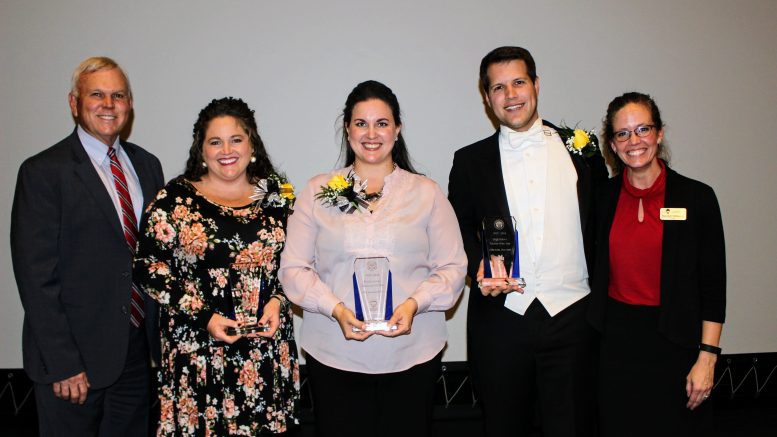
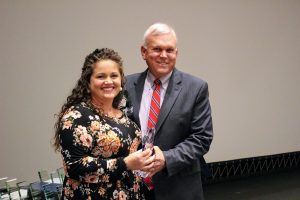
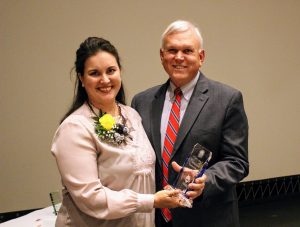
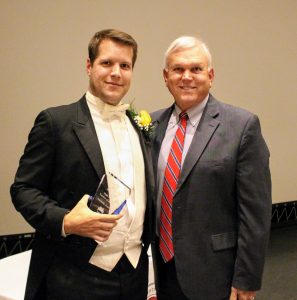
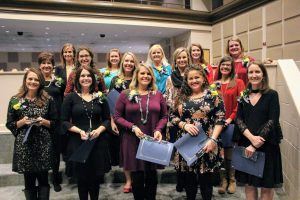
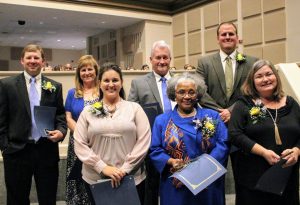
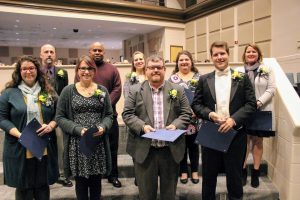
Be the first to comment on "Shelby County Schools Celebrate 2017 Teachers of the Year"